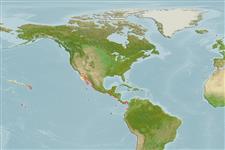Common names from other countries
Environment: milieu / climate zone / depth range / distribution range
Ecologia
marinhas associadas(os) a recifes; intervalo de profundidade 3 - 36 m (Ref. 5227). Tropical; 32°N - 2°N
Eastern Pacific: Gulf of California to Ecuador, including the Galapagos Islands.
Tamanho / Peso / Idade
Maturity: Lm ? range ? - ? cm
Max length : 150 cm TL macho/indeterminado; (Ref. 9324)
Lives in rocky, boulder strewn areas and walls. Lurks in holes, crevices and dark recesses during day; forage in the open at night. Constantly opens and closes its mouth--an action required for respiration, not a threat (Ref. 5227). May occasionally wander into open sandy areas about 10-20 m from cover. Feeds mainly on crustaceans and fishes and are highly responsive to stimuli emanating from wounded or distressed prey at distances exceeding 20 m (Ref. 28023).
Life cycle and mating behavior
Maturities | Reprodução | Spawnings | Egg(s) | Fecundities | Larvas
McCosker, J.E. and R.H. Rosenblatt, 1995. Muraenidae. Morenas. p. 1303-1315. In W. Fischer, F. Krupp, W. Schneider, C. Sommer, K.E. Carpenter and V. Niem (eds.) Guia FAO para Identification de Especies para lo Fines de la Pesca. Pacifico Centro-Oriental. 3 Vols. FAO, Rome. (Ref. 9324)
Categoria na Lista Vermelha da IUCN (Ref. 130435)
CITES (Ref. 128078)
Not Evaluated
Ameaça para o homem
Harmless
Utilização humana
Pescarias: pouco comercial
Ferramentas
Relatórios especiais
Descarregue XML
Fontes da internet
Estimates based on models
Preferred temperature (Ref.
115969): 20.7 - 28.5, mean 25.8 (based on 34 cells).
Phylogenetic diversity index (Ref.
82804): PD
50 = 0.5000 [Uniqueness, from 0.5 = low to 2.0 = high].
Bayesian length-weight: a=0.00047 (0.00025 - 0.00089), b=3.28 (3.13 - 3.43), in cm Total Length, based on LWR estimates for this Genus-body shape (Ref.
93245).
Nível Trófico (Ref.
69278): 4.0 ±0.67 se; based on food items.
Resiliência (Ref.
120179): Muito baixo, tempo mínimo de duplicação da população maior que 14 anos (Preliminary K or Fecundity.).
Fishing Vulnerability (Ref.
59153): Very high vulnerability (90 of 100).
